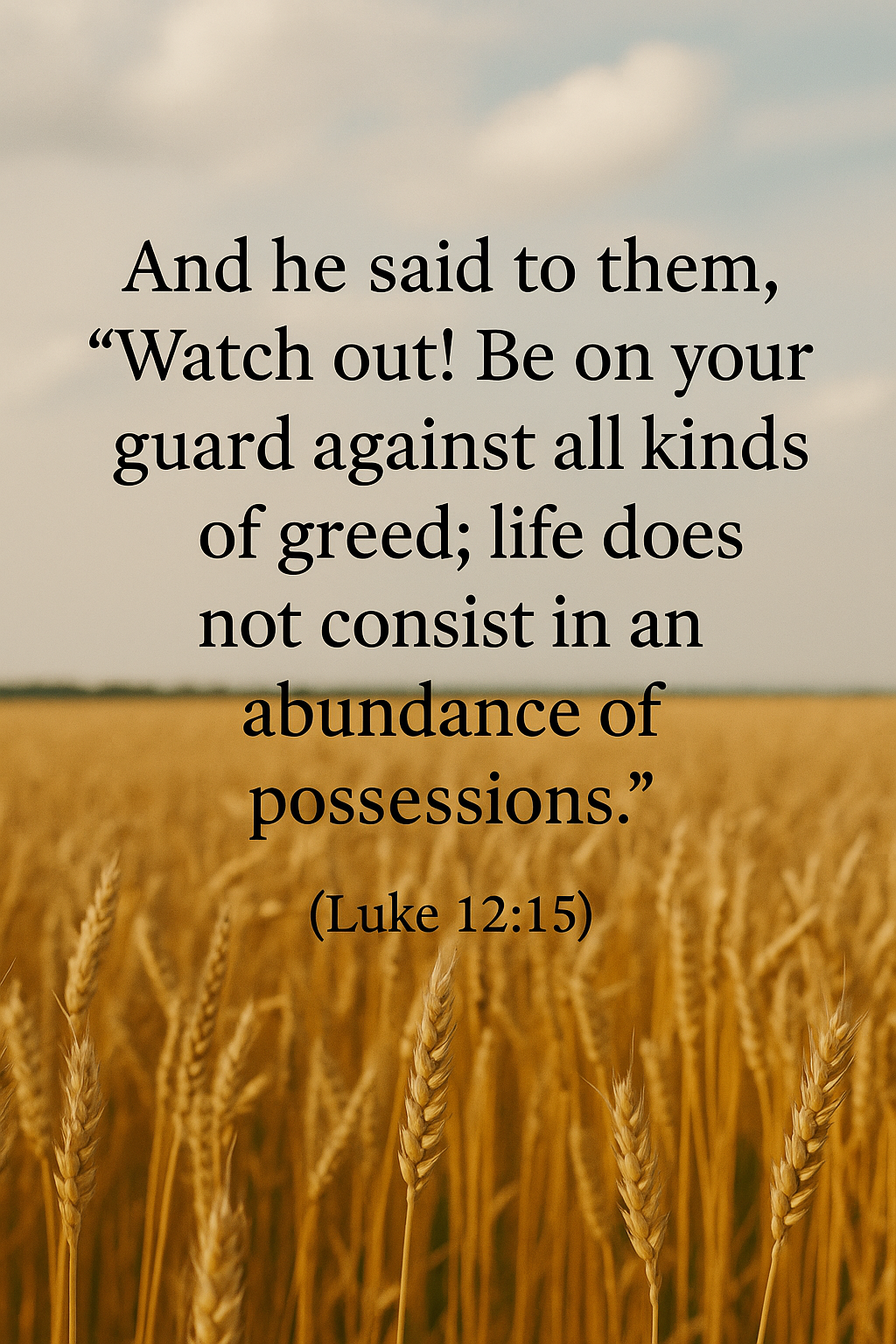Every person looks for love and life, a way to live to bring satisfaction, security, and meaning. We write stories to explore this search, and even commercials leverage our deeper longings to attain a meaningful, happy life. Individuals have this innate need to find their life in something—relationships, career, and more.
Despite how people desire a fulfilling life, most don’t find it. Tragically, we look in the wrong places. Our selfish hearts are easily tempted by a spiritual enemy and a twisted world, deceived by what can’t help or bring us life. Some things might entertain or bring us pleasure for a time, but temporary things can’t satisfy a humanity made in the eternal image of God.
Fortunately, the loving Father sent his Son to earth to save us from Satan and ourselves. He was the revelation of the Father, acting and speaking truth to lead us to eternal life.
Luke 12:15, while only one verse, encapsulates the warning against looking for life in worldly things.
What Is the Context of Luke 12:15?
In Luke 12, Jesus taught a crowd gathered around him, and someone interrupts his teaching to ask Christ to settle an individual family matter. The man says, “Teacher, tell my brother to divide the inheritance with me.”
Like Jesus often does, he addresses what’s behind the question. From his love, he deals with the root issue, the man’s greed, using the situation to warn everyone in verse 15. “Watch out! Be on your guard against all kinds of greed; life does not consist in an abundance of possessions.”
Earlier in the chapter, Jesus spoke to his disciples and the crowd about the hypocrisy of the Pharisees. Christ called on the people to fear God alone, who alone has authority over both life and eternal destinations. Next, Jesus tells them to be bold when confessing faith, promising how the Spirit would help in times of conflict and persecution. Jesus continually pointed people to the eternal reality and his Father, and away from the concerns of this world.
The man’s question and search for a worldly inheritance becomes a teaching moment in light of Jesus’ larger message.
Christ shifts the focus from an earthly inheritance to eternal promises. As he often did, Jesus used a story to support his point. Luke 12:16-21 contains the Parable of the Rich Fool. In this parable, a wealthy man had a huge, abundant crop, too much for his barns. So he built bigger barns to hold the extra, hoarding it for his future ease. But he dies that night, not able to enjoy anything in this life anymore. God calls him a fool for storing treasure on earth without trying to be rich toward God. Jesus later tells the crowd how to have eternal treasure—give to the poor (verses 33-34).
Following the Parable of the Rich Fool, Jesus continues teaching them not to worry about material things, as unbelievers do. The Son instead calls on them to trust the Father and seek the Kingdom of Heaven. That’s the real place to find and store treasure.
What Does Luke 12:15 Say?
"And he said to them, 'Watch out! Be on your guard against all kinds of greed; life does not consist in an abundance of possessions.'” (Luke 12:15)

The Greek word for greed here is pleonexia, which means “an insatiable craving for more.” Jesus doesn’t only tell them to avoid it but to be on guard against it. To “watch out” can also be translated as “watch carefully.” Jesus implies how sneaky and insidious greed is, and if we’re not careful, the desire for stuff (money, luxuries, etc.) will steal our life. We need to be diligent and intentional about rooting greed and covetousness out of our heart.
Jesus follows this statement with the reason for the warning, “for one’s life does not consist in the abundance of possessions.” The Greek uses the word zoe for life. Zoe refers to more than physical existence but to a life of full experience and meaning. Life goes beyond simply breathing and heartbeat, or the things of the body. Jesus confronts the lie common to everyone, that we can find security and life in having more things. True life and wealth can’t be measured by worldly things that easily pass away.
First, the Jewish audience would have noted the warning against greed. It exists in the Ten Commandments. “You shall not covet your neighbor’s house. You shall not covet your neighbor’s wife, or his male or female servant, his ox or donkey, or anything that belongs to your neighbor.” (Exodus 20:17) Jesus teaches against greed several times throughout the Gospels.
At the same time, a Jewish audience would have struggled with a disconnect between God’s blessing and material goods. In the Old Testament, God’s blessed people often enjoyed earthly abundance. The Lord promised land, livestock, harvests, and wealth to those who obeyed the covenant. Abraham got flocks and silver. Isaac prospered in famine. Moses preached how obedience would bring rain, full barns, and peace (Deuteronomy 28:1-12).
Yet Jesus called them to the greater blessing, the one who blesses. Even in the Old Testament, God called his people to a deeper, more meaningful relationship through obedience, especially in difficult times. The Jews of Jesus’ day were seeking a Messiah who would restore an earthly kingdom like David did, not the higher and better spiritual one Jesus would bring. For their good, and to enjoy the true riches in God, Jesus called them to the Father instead of focusing on this world.
Why Can’t We Find Life in Material Things?
Material possessions aren’t evil. They have a function and a purpose. God created all good things for us to enjoy. Even that statement, however, comes within an eternal focus. “Command those who are rich in this present world not to be arrogant nor to put their hope in wealth, which is so uncertain, but to put their hope in God, who richly provides us with everything for our enjoyment” (1 Timothy 6:17). Riches aren’t evil, but they can be deceitful (Matthew 13:22). They have no personality or life, so the lies come from us, the devil, and the world, attempting to get us to place our security and hope on them. The problem arises with how we approach them and the motives of our hearts, not the things themselves. The money isn’t evil, but loving it is (1 Timothy 6:10), even a “root” of other evils.
Material things are temporary and provide no security, as Jesus reveals in the Parable of the Rich Fool. He built bigger barns that did him no good. Possessions can offer good things, but they fade, break, or lose value. We are eternal beings, and we seek eternal relationship. When we place our eternal desires upon material things, we make idols of them. Paul tells us greed is idolatry (Colossians 3:5).
Jesus consistently teaches this principle. In Matthew 6:19-21, he says, “Do not lay up for yourselves treasures on earth, where moth and rust destroy and where thieves break in and steal, but lay up for yourselves treasures in heaven... For where your treasure is, there your heart will be also.” Earthly things are vulnerable to the entropy and corruption of this world, even from the evil of people.
Christ fed thousands with little, yet even after such a miracle, he talks about getting their focus away from the material. “Do not work for the food that perishes, but for the food that endures to eternal life.” (John 6:27) He had compassion on people’s physical needs, but he still warns them trying to make it a priority to satisfy bodily hunger. Paul also deals with this later, writing how some people fell away from Christ, in part, because their god was their stomach (Philippians 3:19).
Possessions can’t provide identity, lasting peace, hope, or life. That comes from one person alone.
How Does Jesus Define a Truly Meaningful Life?
To begin with, God is life. Life doesn’t exist apart from him. So we find Jesus teaching how life is found in him, flowing from the Father. Christ declares, “I am the way, the truth, and the life. No one comes to the Father except through me.” (John 14:6) When we try to find life in things, even good things, we create an idol. Real life is found in Christ, the one who reveals the Father and reconciles us to God.
Jesus further defines eternal life this way: “This is eternal life: that they know you, the only true God, and Jesus Christ whom you have sent.” (John 17:3) This knowing goes beyond academic information or doctrine. Here, knowing means to become one with, to experience personally. As God is life, direct engagement with him brings us to life. Jesus becomes our satisfaction. Instead of a temporary fix, Jesus offers himself as true sustenance. “I am the bread of life; whoever comes to me shall not hunger, and whoever believes in me shall never thirst.” (John 6:35) Our lives flow from the inward, unseen parts of us. As he redeems the core of us with his Spirit, we find what our souls long for.
We attain this life by giving up our own. That’s the deal. We trade our dead and dying selves for his eternal life. “Whoever would save his life will lose it, but whoever loses his life for my sake will save it.” (Luke 9:24) Seeking after material things often stems from trying to find security in this life, to essentially save ourselves from difficulty, but this is a lie, leading us to death. When we give up our agendas, submit our will to the Father, we find the life he created us to have, fulfilling us on every level.
With his life, we can be thankful with what we have. Not seeking for more, we find contentment with the provision and earthly resources God provides for us.
Finding life in material things also distracts us from how we can save things that last. We encounter two eternal things every day—God and people. Therefore, Jesus teaches how to store up treasure in heaven. “Sell your possessions and give to the poor … a treasure in heaven that will never fail.” (Luke 12:33) Treating people with God’s love and eternal value, sacrificing what we have for their good, builds reward in heaven we can’t lose. Unlike material goods, heavenly wealth can’t be stolen, won’t rust, and won’t fade. We can’t lose that investment.
Jesus didn’t teach against accumulating wealth because he’s against our good. On the contrary, he sought to give us the greater good, seeking God alone, the one who exists and is a rewarder of those who diligently seek him (Hebrews 11:6).
Peace.
Photo Credit: ©iStock/Getty Images Plus/William_Potter




